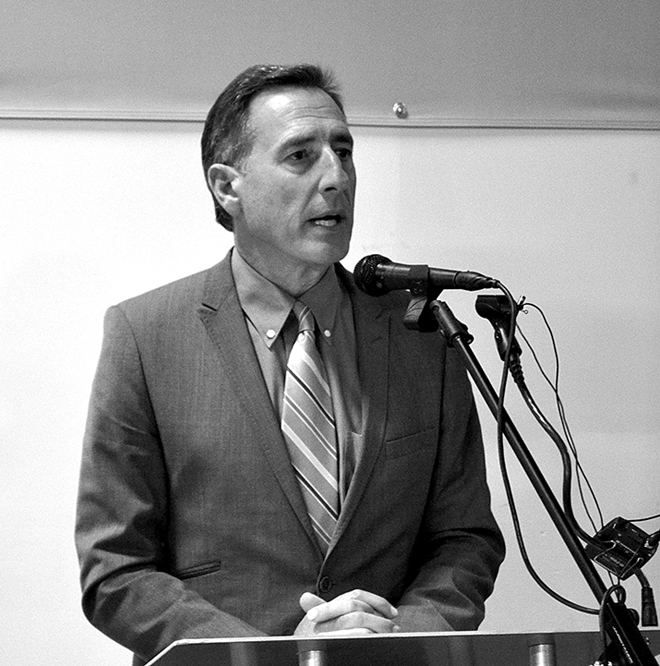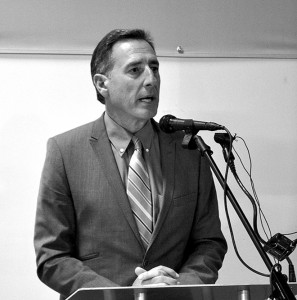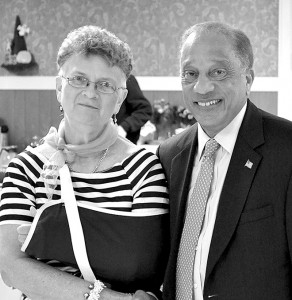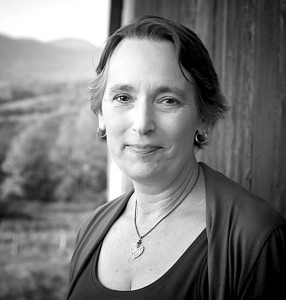

copyright the Chronicle 10-31-2012
by Bethany M. Dunbar
“When your hair is on fire, you don’t call for a moratorium while you go put your hair out,” said Governor Peter Shumlin.
Mr. Shumlin’s point is that the planet is facing a global crisis, and with oil going regularly up to $4 a gallon and the effects of climate change being felt everywhere including Vermont, “We can’t get off oil quickly enough.”
In the Northeast Kingdom two major wind turbine projects are — depending on your point of view — either a tribute to his efforts to make renewable energy happen quickly, or a symbol of top-down government that allows little local control.
One can’t say there is no local control involved because host towns have had an opportunity to vote on whether or not they want these projects.
“I happen to think they’re beautiful,” said Mr. Shumlin. “I am sympathetic and empathetic to those who are not in favor.”
He said any town that votes a project down should not have to host it, and he’s made that opinion clear to the three-member Public Service Board (appointed by the Governor) that makes decisions on wind projects.
“I think the Public Service Board process works,” he said.
All that doesn’t stop neighbors in towns that suffer equal or more effects from wind projects and don’t have a vote, and don’t get property tax benefits, from getting frustrated.
That frustration is part of the platform of two of the Governor’s opponents. Republican Randy Brock, formerly the state’s auditor and currently a state senator, supports a moratorium and says Vermont’s already got the cleanest energy portfolio of any state.

“The whole industrial wind thing is an issue for so many people,” he said. He was one of the co-sponsors of the moratorium. “I don’t think we’ve really done the homework.”
“When we blow off the mountaintops it has an impact on all the surrounding towns and all of Vermont,” he said. “I’m concerned about the effect on the aesthetics and the ecosystems,” he said. “I’m also concerned about the economic issues.”
He said Vermont does not actually use much coal or oil. Mainly our electric power comes from nuclear power, natural gas, and hydroelectricity. Coal and oil account for only 3.3 percent of Vermont’s electrical energy, he said.
He said while he supports renewables for the future, “the technology isn’t here.” For one thing, it’s still too expensive, he said. That means by building it now, poor and working class Vermonters are footing the bill for corporations to get into renewables.
“What I see here is Robin Hood in reverse.”
He said building renewables in Vermont could cost the state jobs as the cost of electricity goes up too high, and companies like IBM start taking a closer look at their expenses. IBM pays 25 percent less for electricity in one nearby state and 50 percent less in Canada.
Annette Smith is the executive director of Vermonters for a Clean Environment. She got into the race for governor late — reluctantly at first, and mainly because people asked her to. She was narrowly defeated in the Primary for a Progressive nomination, which means her name is not on the ballot. But she is continuing as a write-in. The winner of the Progressive nomination, Martha Abbott, stepped down, saying the party agrees with Governor Shumlin on two of the issues most important to the party — closing the aging, dangerous Vermont Yankee nuclear plant and health care. Yet the party stopped short of endorsing Mr. Shumlin.
Ms. Smith said voters who want more local control should write in her name. She has a history of figuring out strategies for fighting back against corporations that seem to want to roll over the regular people at times.
“I do have a process that has worked and made me very effective,” she said. She said her preference is not to “break the rules but redefine the rules.”
“This campaign is not just about wind. It’s about local control.”
Asked her position on the jobs and the economy, she said, “I see nothing but opportunities in Vermont. We have a tremendously intellectual population and skilled people.”
She said a lot of people look at economic development as an effort to bring in large manufacturing companies, but she would like to see more new small ones starting up.

“I see the capital we have right here in Vermont being put to use,” she said.
On that she and Mr. Brock agree. He said jobs and the economy are the number one issue for him.
“We’ve got to grow our economic pie instead of figuring out how to cut it up,” he said. He said his first task as Governor will be to go around to all the welcome centers and where the signs say, “Welcome to Vermont” he will add one underneath it: “Open for business.”
“We need to change the perception that Vermont isn’t open for business,” he said. He said Vermont is open, and the permits that developers need to obtain are not unnecessary. “Our environment is really important. We don’t want Vermont to look like New Jersey.” He said sometimes it’s a matter of changing the emphasis of people who handle the permit process. He said when a developer comes in the door, the state permit workers should adopt an attitude that the permits are important but “my job is to help you be successful.”
He would like to set up a micro loan program for people who are unemployed and want to start a business instead of just getting a job.
“We have a lot of talented people that are unemployed,” he said.
Mr. Shumlin gives high priority to job creation as well, and he points out that he’s had considerable success in that area. He said Vermont has the fifth lowest unemployment rate in the country, and is the only state that saw income growth in the past two years.
“I promised that I would focus on job creation like a laser,” he said. In Newport to celebrate a contract for helmets at the Revision Military helmet plant earlier this month, Governor Shumlin said, in an interview after the press conference, the recent announcement by Bill Stenger and others about 5,000 to 10,000 jobs for the area is wonderful news.
To those who are nervous about possible consequences from the development, Mr. Shumlin said fear of change is always going to be a factor for people, but this is good news. Put in perspective, 5,000 people is not a huge number, he said — Jay Peak might have that many on the slopes on a busy day in the winter.
“Let’s rejoice in the simple fact,” he said. Issues of infrastructure for those jobs can certainly be solved, he said.
Mr. Shumlin worked on a bill that changed the wording of state law to make Vermont government documents more open and accessible to the press and the public, and he said if re-elected he will continue those efforts.
There are currently over 200 exceptions to a state law that says government records should be open to the public. Instead of trying to comb through them all at once and get rid of unnecessary exceptions, the Governor said he wants to take one area at a time, starting with the courts and police.
Governor Shumlin might be best known for his support of a single-payer government health care plan that would make sure all Vermonters have access to affordable health care. It is a lofty goal, and the Legislature has passed a law to move in that direction. But that next step is dependent on federal funds that are most likely dependent on the re-election of President Barack Obama.
Meanwhile, Mr. Shumlin’s challengers both say they are not convinced it’s the way to go, or maybe not exactly as proposed.
Ms. Smith said she is in favor of single-payer, but believes the state must get a handle on costs and offer choices to patients.
“I would like us to move much more toward consumer-driven health care,” said Mr. Brock. He said there are steps that can be taken right away to address many of the concerns Vermonters have about health care, including making the costs of every procedure transparent. At a gut level, he believes competition would drive the costs down and increase the quality better than a government plan would do.
Health care is one-sixth of Vermont’s economy at $5-billion, he said, and a board of five unelected people should not be the ones making all the decisions. He’d like to look at what some other states are doing, including Maine, he said.
“Is there a reason that 49 other states are not doing what we are doing?” he asked.
Emily Peyton, who is running for Governor as an independent, made a campaign swing through Barton, but efforts to arrange a time for an interview were not successful. Ms. Peyton is from Putney. She has a background in videography and supports organics, industrial hemp, and holistic health. Cris Ericson is a candidate under the United States Marijuana Party in Vermont. Dave Eagle is the Liberty Union Party candidate and calls himself an information technology refugee.
contact Bethany M. Dunbar at [email protected]
For more free articles from the Chronicle like this one, see our Editor’s Picks pages. For all the Chronicle’s stories, pick up a print copy or subscribe, either for print or digital editions.







